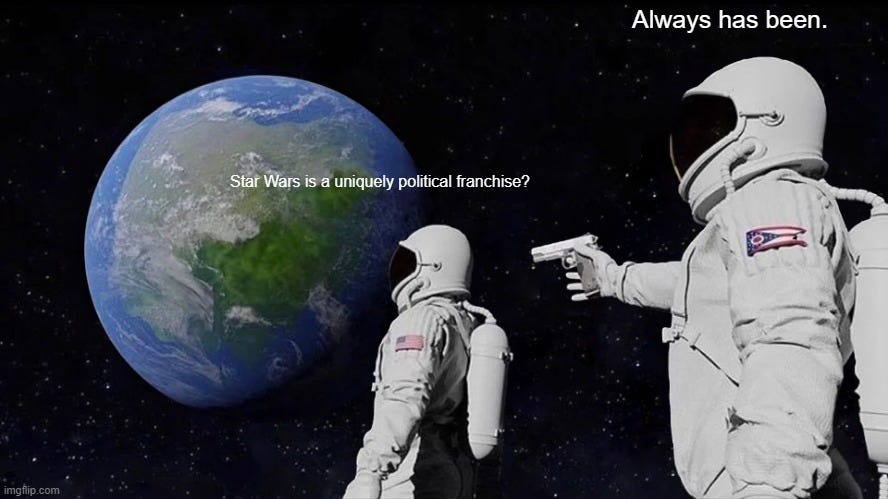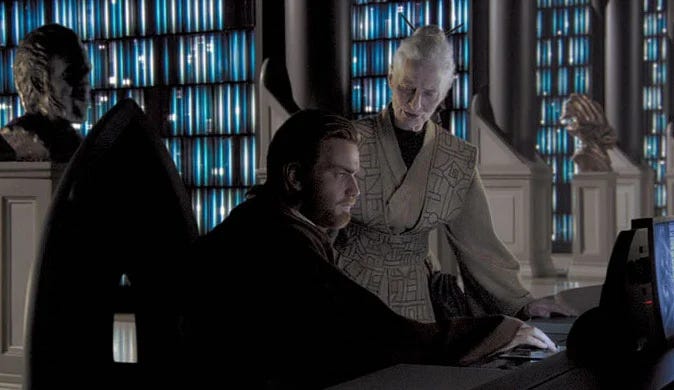IR Part 1: Introduction to Star Wars Studies
A Review of the Academic State of the Art So Far
*This chapter will be filled with an unusually high number of references, as is typical for literature reviews. Its primary purpose is to give an overview over some of the relevant academic pieces making sense of the Star Wars universe. A focus will be on Social Sciences, Humanities, and Law Studies, since they are the most relevant to the study of International Relations. Lastly, how the research approach will deal with the challenges of canonical problems and research gaps or academic disagreements would go beyond the scope of this article and will be explored in a forthcoming entry.
As we struggle to combat climate change and potential overpopulation, it is unsurprising that mankind once more looks to the stars. Already, states clash over exploiting resources beyond earth, for instance on the moon. Undoubtedly, we will soon have no choice but to prepare our escape pods and abandon our planet. Surveying recent developments in the cultural sphere only strengthens this conclusion; whether it is Star Wars, Star Trek, or newcomers like The Expanse, more space-operas can only mean one thing: resettlement.
The release of this plethora of Star Wars content though, is also an argument for the continued relevancy and influence of the saga: from philosphy and court trials to international relations. Despite the increasingly complex and ever-growing nature of the universe, it remains easily comprehensible due to the simple divisions of the force, or those of evil empire and virtuous rebellion. There are reasons why U.S. President Reagan, during the later stages of the Cold War, framed his policies in the light of Star Wars; even George Lucas himself had politicized the movies according to real-life developments1.

Consequently, Star Wars is uniquely suited to the analysis of interplanetary relations. It has been extensively documented and thus makes cross-narrative comparisons with other fictional stories appear unnecessary. This further means we need not worry about obstructing findings with discussions of basic, galaxy-specific physics debates across diverging universes.
It is striking however, how the organization of interplanetary relations has been largely ignored in scientific literature. Despite the extent and cultural significance, Star Wars has not been subjected to related sustained analytical efforts. Whether we will need a policy of galactic containment2, or need to deter alien invasions, this remains a crucial puzzle, both for our academic discipline, as well as in guiding politicians understanding and decision-making-process. This lack of systematic engagement should gnaw at students, experts, and practitioners of international relations alike. It prompts the question: how well are we prepared to make sense of the interplanetary system which awaits us?
Begun, the Research Has!
Natural sciences have already engaged in ground-breaking research of the challenges lying ahead of us. We have gained an exemplary picture of the biological and historical evolution of a number of not-so-earthly species. Linguistics has provided a more advanced understanding of some of their communications. Hyperspace travel has been subjugated to a thorough analysis in the field of physics. Engineering has provided a more comprehensible picture of the crafts used to navigate the galaxy.
By contrast, social sciences’ inquiries have been scarce and selective. Only recently have nascent attempts emerged to transplant such ideas into a galaxy far, far away, likely due to the releases of episodes seven till nine. However, this growing interest can only be regarded as a starting point. Although the representation and reception of Star Wars in our universe has received regular attention, actual interplanetary-oriented scholarship thus remains less than a confederacy of independent articles.
Some of those works have focused on constitutional matters. A predominant focus appears to be the Republic’s transition into the Empire during the prequels. Firstly, this involves the Senate’s inconsistent and problematic formalities, as well as the wider causes for democratic backsliding towards an authoritarian empire. Secondly, others have put emphasis on the emerging techno-security culture during the Clone Wars and early days of the Empire. Yet, in turn, this discussion of checks and balances has been rather narrow in its scope, barely touching on the difficulties of constructing a New Republic in the post-Endor-era. Yet, precisely this state-building activity will be of fundamental significance following humanity’s relocation.
Additionally, legal perspectives and philosophical views3 are partially intertwined in the deconstruction of “universal” doctrines. On one hand, the Jedi’s intellectual foundation has been analysed using Buddhist, Taoist, or Critical Theory analogies of our age. On the other side, military activities also motivated scientific engagement; specifically the destruction of Alderaan4 prompted wider discussions about the evil nature of both Empire and Rebellion. Such approaches have further been complemented by primary source material detailing various war crimes particularly during the horrid Clone Wars.
International Relations by contrast, have devoted little attention to the study of interplanetary cooperation and conflict. Some advances have been made regarding initial applications of conventional IR theories to the galaxy, yet, they remain far from being comprehensive. Moreover, since these engagements remain brief in nature, assumptions and arguments often leave room for debate, exemplary in the discussion of liberal elements in the doctrines of Sith and Jedi. I sense a great disturbance in our prospects for progress, if are we to proceed in such an uncivilized fashion.
Finding New Academic Planets
A survey of the literature on intergalactic relations subsequently reveals two apparent problems. Firstly, the scholarly work on Star Wars has often progressed in fragments, rather than on systematic scale. Beyond the discussion of isolated and specific models, even the application of international relations theory has been occurring selectively. However, as a little green muppet once decreed: “Do or do not, there is no try.” If we are to seriously engage in Interplanetary Relations, a more structured, sustained effort must be made.
Secondly, our evidence almost exclusively stems from the movies’ representation of the galaxy. Especially the pre-republic and post-empire eras present a blindspot, and even the Clone Wars have only been examined on a superficial level. Consequently, theoretical generalisations remain significantly obstructed due to the limited use of empirical evidence. This presents a great opportunity to gain new insights into the operation of our established theories.
This article subsequently serves as a starting point to a more elaborate attempt at systematically developing the field of Star Wars’ interplanetary security relations. Drawing on extensive galactic archival data and statistical records as sources of evidence, I will pursue a twofold approach towards political theories. On one side, broader theories of international relations should provide a path to many understandings of the universe, some would consider to be paradigmatic. On the other side, more weight should be given to specific models in order to develop a more in-depth perspective. This way, I hope, a balance in the force can be achieved, between foundations of both realms, and incrementally exploring unknown regions.




